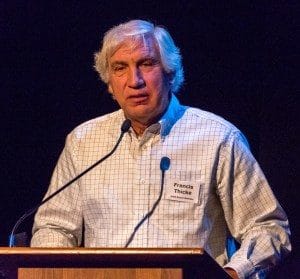Cornucopia’s Take: Francis Thicke runs Radiance Dairy, a 236-acre grass-based dairy in Iowa. He retired from his position as an environmental representative on the National Organic Standards Board (NOSB) last year, offering deeply honest and memorable closing comments. Francis is presently the chair of the Policy Committee of the Organic Farmers Association and sits on the Real Organic Standards Board. He gave testimony at the recent NOSB webinar on the European Union’s prohibition of hydroponics in organic. Read his comments below.
Francis Thicke testimony to the NOSB webinar:
 |
My name is Francis Thicke, and I am speaking today on behalf of the Organic Farmers Association. The Organic Farmers Association is a national membership organization for certified organic farmers and their supporters. Our mission is to provide a strong and unified voice for U.S. certified organic producers.
The Organic Farmers Association has learned of very recent developments in the European Union that have major ramifications for US hydroponic production that is certified organic.
Just this morning (April 19) the European Parliament voted on and passed a regulation that does three things: First, it confirms an existing EU ban on hydroponic production; second, it introduces a stricter definition of soil-bound production, that it must be connected to subsoil and bedrock; and third, it will prohibit the importation of hydroponically produced organic food from non-EU nations, including the United States. This new regulation, approved today, will take effect January 1, 2021.
Already the EU does not allow organic certification of hydroponic production. However, three Nordic countries currently do allow organic production in demarcated beds, which accounts for just a tiny percentage of total EU organic production. The new EU regulation will phase out demarcated beds for existing facilities in those three Nordic countries over ten years and will prohibit the development of new facilities with demarcated beds. So, by 2031, production in demarcated beds will no longer be allowed to be certified organic for all 28 members of the EU, including the Nordic countries.
The new EU regulation prohibiting hydroponic production also prohibits all container production to be certified organic. The regulation specifically requires organic production to be in soil that is connected to subsoil and bedrock.
Currently the US and EU have an equivalency agreement that allows certified organic products from the U.S. to be sold as certified organic in the EU, and vice versa. The new EU regulation will modify that equivalency agreement with a Conformity Principle that will require U.S. imports to comply with the new EU standards that prohibit organic certification of hydroponic production.
In short, U.S. growers and handlers will no longer be able to ship U.S. certified organic food that has been grown hydroponically to the European Union and sell it as organic. That will be considered fraudulent by the EU, and they will take steps to prevent it and will penalize those who do not comply.
The Organic Farmers Association urges USDA to reconsider its decision to allow hydroponically produced food to be certified organic and to follow the lead of the European Union regarding hydroponic production. For starters, I would like to urge the NOP to allow the Crops Subcommittee to put the discussion document on container and field growing back on the work agenda for the fall 2018 NOSB meeting.
In conclusion, OFA strongly believes that the letter and the spirit of the Organic Foods Production Act and the regulatory text of the National Organic Program prohibit the organic certification of hydroponic production. Allowing hydroponic production to be certified as organic damages the integrity and credibility of the organic seal, both at home and abroad.
Thank you.

